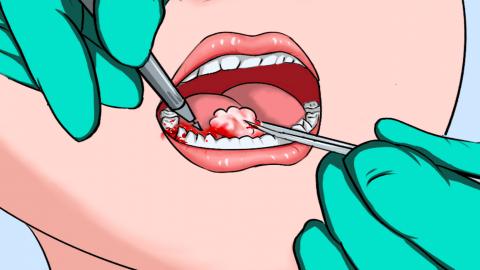What medication should I take for wisdom tooth pain?
Generally, wisdom tooth pain is mostly caused by partially erupted or impacted wisdom teeth, which can lead to bacterial infection or gum inflammation. Patients may take medications under medical guidance, such as Metronidazole Tablets, Ibuprofen Sustained-release Capsules, Cefuroxime Axetil Tablets, Amoxicillin Capsules, and Diclofenac Sodium Enteric-coated Tablets. The detailed explanations are as follows:
1. Metronidazole Tablets
This medication belongs to anti-anaerobic bacterial drugs and can specifically target and eliminate anaerobic bacteria causing inflammation around wisdom teeth, such as Porphyromonas gingivalis. It effectively controls bacterial infection around the wisdom teeth, reduces gum redness, swelling, and pain. It is often used in combination with other antibiotics to enhance therapeutic effects and is suitable for patients with acute pericoronitis of wisdom teeth.
2. Ibuprofen Sustained-release Capsules
This is a non-steroidal anti-inflammatory drug (NSAID) that exerts anti-inflammatory and analgesic effects by inhibiting prostaglandin synthesis. It rapidly alleviates severe pain and inflammatory responses caused by wisdom tooth pain, with a prolonged duration of action. It can improve patients' daily eating and rest conditions and is suitable for patients with mild to moderate wisdom tooth pain.

3. Cefuroxime Axetil Tablets
This antibiotic belongs to the second-generation cephalosporins and has antibacterial activity against both Gram-positive bacteria and some Gram-negative bacteria. By inhibiting bacterial cell wall synthesis, it prevents bacterial proliferation and controls bacterial infection around wisdom teeth. It is suitable for patients with significant inflammation or infection spread associated with wisdom tooth pain.
4. Amoxicillin Capsules
This medication exerts bactericidal effects by inhibiting bacterial cell wall synthesis and is effective against infections around wisdom teeth caused by susceptible bacteria. It is suitable for patients not allergic to penicillin antibiotics and is often used in combination with anti-anaerobic bacterial drugs to cover a broader range of pathogens and enhance anti-infective effects.
5. Diclofenac Sodium Enteric-coated Tablets
This is also a non-steroidal anti-inflammatory drug with strong anti-inflammatory and analgesic effects. It inhibits cyclooxygenase activity and reduces the release of inflammatory mediators, significantly relieving severe gum swelling and pain associated with wisdom tooth pain. It is suitable for patients with prominent pain symptoms or those who do not respond well to other NSAIDs.
Maintaining good oral hygiene in daily life is important. Rinse your mouth promptly after meals, brush your teeth carefully in the morning and evening, avoid chewing food on the side of the wisdom teeth, and limit consumption of spicy or hard foods such as chili peppers and nuts to prevent irritation of the affected area and worsening of the pain.







